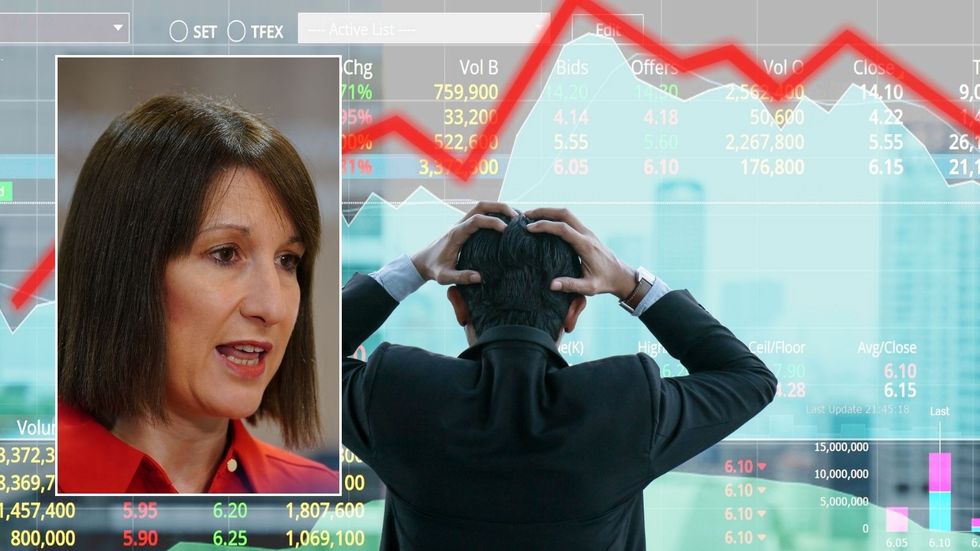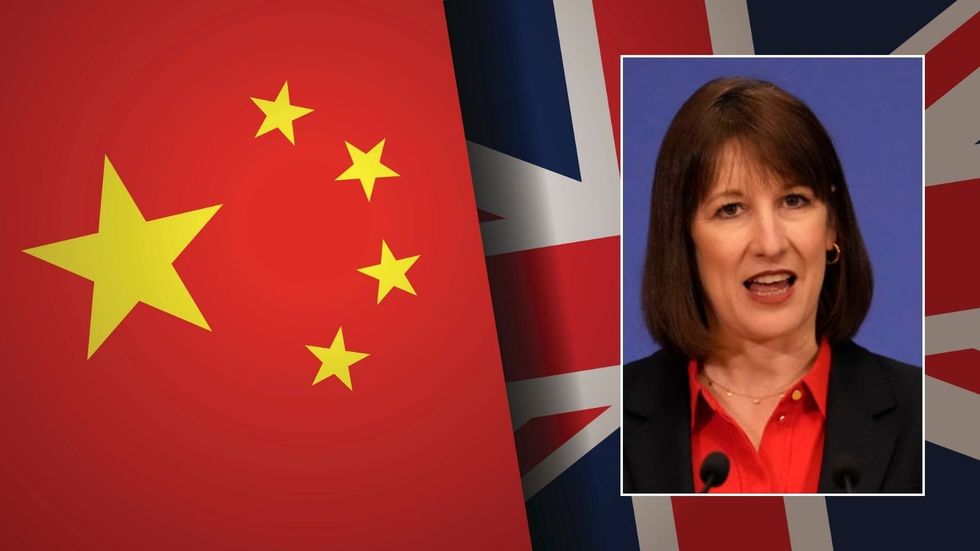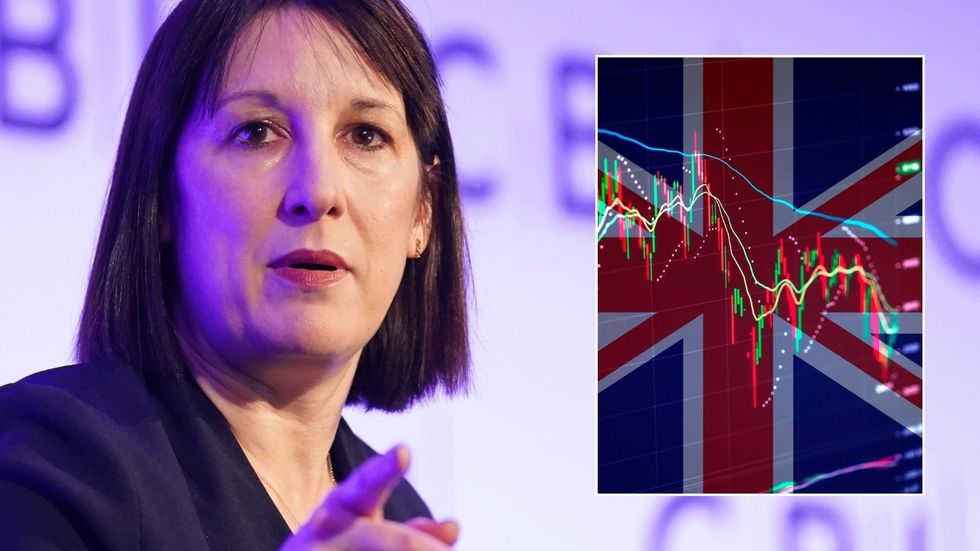Patrick O'Donnell
Guest Reporter
Business leaders have delivered a stark warning about the UK economy, heaping fresh pressure on Chancellor Rachel Reeves at the start of the week. A new survey by Deloitte has revealed that Britain's top financial executives have turned pessimistic about their business prospects for the first time since mid-2023.
The quarterly survey of chief financial officers (CFOs), conducted in December, found that a net 26 per cent felt more downbeat about their companies' outlook compared to three months ago.
This marks a significant shift in sentiment, though Deloitte notes that pessimism levels remain well above the lows witnessed during both the COVID-19 pandemic and Liz Truss's brief tenure as Prime Minister in 2022.
Ian Stewart, Deloitte's chief economist, highlighted that CFOs have reduced their expectations for corporate investment, discretionary spending and hiring in the coming year.
Cost control has emerged as the top priority for financial executives following increases to national insurance, maintaining its position as the primary concern for nearly three years.
Do you have a money story you’d like to share? Get in touch by emailing [email protected].

The survey revealed that expectations for new hiring have dropped to their lowest point in four years. This shift in business sentiment comes at a challenging time for the Government, which has made commitments to boost disposable income and increase employment levels.
However, the outlook is not entirely negative, with businesses anticipating growth to improve over the summer months, potentially outpacing both 2024's figures and eurozone performance.
According to the survey's results, there are some encouraging signs for the British economy amid the general gloom, with inflation concerns appearing to have diminished.
The UK continues to maintain its investment appeal ahead of Europe, though it trails behind the United States in attractiveness to investors.
"2025 seems to be a year of continued if modest UK growth," said Stewart.
He added: "Looking ahead, a continued emphasis on policies to unlock the UK's potential remain key to shifting the trajectory of activity."
Rupert Soames, the chairman of the Confederation of British Industry (CBI), claims Rachel Reeves has "bruised" the trust of Britain's business community with her decision-making.
Speaking to the BBC, he said: "The Chancellor told us at the time of the budget that there was an unexpected hole of about £22billion in the Government finances, and business was going to have to fill it. In filling in one hole, it’s created another, and that hole is a hole in the confidence and trust that business has in the Government.
The findings come as a fresh challenge for the Chancellor, following a week of rising Government borrowing costs amid a global bond sell-off. Ministers have defended the gilt market's performance, describing it as "orderly", though increased borrowing costs threaten to reduce Reeves's fiscal headroom.

During her recent trip to China, Reeves maintained a firm stance on her fiscal policies, declaring them "non-negotiable".
The Chancellor pledged to "take action" if necessary to ensure her fiscal rules are met.
The mounting pressure on the Chancellor in recent months has prompted support from Cabinet colleagues, with Health Secretary Wes Streeting calling for public patience.
LATEST DEVELOPMENTS:

Speaking at the Jewish Labour Movement's annual conference on Sunday, Streeting acknowledged the pressure facing the Chancellor but expressed "total confidence" in her economic management.
However, Conservative shadow business secretary Andrew Griffith seized on the Deloitte survey findings, claiming Reeves had "made Britain more vulnerable because of her decisions".
Barret Kupelian, chief economist at PwC, previously said: "Last year, we predicted 2024 would see the UK turn a page, and in many ways it did - inflation returned back to target levels, there was some progress on regional growth and real incomes grew.
"This year, our predictions show that the UK will undergo subtle yet significant transformation in both its internal and external environment. We expect to see economic power shift eastwards on the European continent, with the collective economy of the six largest Eastern European EU ‘newcomers’ to surpass the UK."
Find Out More...
The quarterly survey of chief financial officers (CFOs), conducted in December, found that a net 26 per cent felt more downbeat about their companies' outlook compared to three months ago.
This marks a significant shift in sentiment, though Deloitte notes that pessimism levels remain well above the lows witnessed during both the COVID-19 pandemic and Liz Truss's brief tenure as Prime Minister in 2022.
Ian Stewart, Deloitte's chief economist, highlighted that CFOs have reduced their expectations for corporate investment, discretionary spending and hiring in the coming year.
Cost control has emerged as the top priority for financial executives following increases to national insurance, maintaining its position as the primary concern for nearly three years.
Do you have a money story you’d like to share? Get in touch by emailing [email protected].

The survey revealed that expectations for new hiring have dropped to their lowest point in four years. This shift in business sentiment comes at a challenging time for the Government, which has made commitments to boost disposable income and increase employment levels.
However, the outlook is not entirely negative, with businesses anticipating growth to improve over the summer months, potentially outpacing both 2024's figures and eurozone performance.
According to the survey's results, there are some encouraging signs for the British economy amid the general gloom, with inflation concerns appearing to have diminished.
The UK continues to maintain its investment appeal ahead of Europe, though it trails behind the United States in attractiveness to investors.
"2025 seems to be a year of continued if modest UK growth," said Stewart.
He added: "Looking ahead, a continued emphasis on policies to unlock the UK's potential remain key to shifting the trajectory of activity."
Rupert Soames, the chairman of the Confederation of British Industry (CBI), claims Rachel Reeves has "bruised" the trust of Britain's business community with her decision-making.
Speaking to the BBC, he said: "The Chancellor told us at the time of the budget that there was an unexpected hole of about £22billion in the Government finances, and business was going to have to fill it. In filling in one hole, it’s created another, and that hole is a hole in the confidence and trust that business has in the Government.
The findings come as a fresh challenge for the Chancellor, following a week of rising Government borrowing costs amid a global bond sell-off. Ministers have defended the gilt market's performance, describing it as "orderly", though increased borrowing costs threaten to reduce Reeves's fiscal headroom.

During her recent trip to China, Reeves maintained a firm stance on her fiscal policies, declaring them "non-negotiable".
The Chancellor pledged to "take action" if necessary to ensure her fiscal rules are met.
The mounting pressure on the Chancellor in recent months has prompted support from Cabinet colleagues, with Health Secretary Wes Streeting calling for public patience.
LATEST DEVELOPMENTS:
- Cabinet told to be 'ruthless' over public spending cuts- Treasury urged to 'maximise' spending power
- Reeves slammed for returning from China with 'puny' deal that makes Britain a 'laughing stock'
- Britain's economy to get £600m boost in landmark China deal, Reeves claims

Speaking at the Jewish Labour Movement's annual conference on Sunday, Streeting acknowledged the pressure facing the Chancellor but expressed "total confidence" in her economic management.
However, Conservative shadow business secretary Andrew Griffith seized on the Deloitte survey findings, claiming Reeves had "made Britain more vulnerable because of her decisions".
Barret Kupelian, chief economist at PwC, previously said: "Last year, we predicted 2024 would see the UK turn a page, and in many ways it did - inflation returned back to target levels, there was some progress on regional growth and real incomes grew.
"This year, our predictions show that the UK will undergo subtle yet significant transformation in both its internal and external environment. We expect to see economic power shift eastwards on the European continent, with the collective economy of the six largest Eastern European EU ‘newcomers’ to surpass the UK."
Find Out More...
